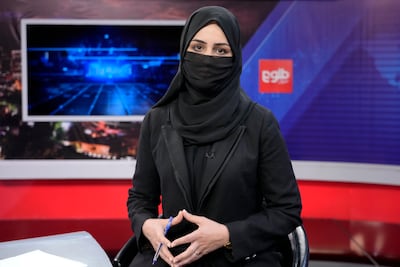Male Afghan TV presenters are covering their faces in solidarity with their female colleagues who must obey a strict Taliban rule on face coverings.
Several male newsreaders, including Sebghat Sepehr, a presenter on local network TOLOnews, were seen wearing black face masks on Sunday, after the Taliban began enforcing an order requiring all female TV news presenters in the country to cover their faces while on air.
The move is part of a hard-line shift from Afghanistan’s rulers that has drawn international condemnation from human rights activists.
Only a handful of news outlets have complied with the ban since it was announced on Thursday.
Women presenters were previously required to wear only a headscarf but on Sunday, most female presenters were seen with their faces covered, one day after the Taliban’s decree to cover up.
Earlier this month, Taliban leader Hibatullah Akhundzada ordered women to cover their faces in public, ideally with the traditional burqa.
The Ministry for Promotion of Virtue and Prevention of Vice ordered women TV presenters to follow suit from Saturday.
The Information and Culture Ministry previously announced that the policy was “final and non-negotiable”.
“It is just an outside culture imposed on us forcing us to wear a mask and that can create a problem for us while presenting our programmes,” said Sonia Niazi, a TV presenter with TOLOnews.
TOLOnews’ deputy director, Khpolwak Sapai, told AFP that the channel was “forced” to make its staff follow the order.
“I was called on the telephone yesterday and was told in strict words to do it. So, it is not by choice but by force that we are doing it.”

During the Taliban’s previous stint in power in Afghanistan from 1996 to 2001, they imposed overwhelming restrictions on women, requiring them to wear the burqa and barring them from public life and education.
However, since the Taliban were ousted from office in 2001, many women in the conservative countryside continued to wear a burqa.
After they seized power again in August, the Taliban claimed they would treat women differently and announced no dress codes initially.
But in recent weeks they have made a sharp, hard-line turn that has confirmed the worst fears of rights activists and further complicated Taliban dealings with an already distrustful international community.
The Taliban this month ordered all women in public to wear head-to-toe clothing that leaves only their eyes visible. The decree said women should leave the home only when necessary and that male relatives would face punishment for women’s dress code violations, starting with a summons and escalating to court hearings and jail time.
The Taliban has also barred girls from attending school after sixth grade, reversing previous promises by officials that girls of all ages would be allowed an education.

